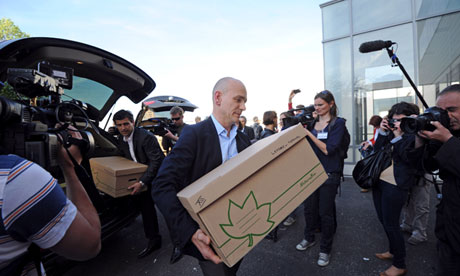
The first trial over the global scandal of faulty breast implants made with cheap industrial silicone not fit for humans opens on Wednesday, with hundreds of women expected to attend to tell of their suffering.
Jean-Claude Mas, the founder of the French firm Poly Implant Prothèse (PIP), and four of his senior staff will stand trial for aggravated fraud and face up to five years' jail and a €37,500 (£32,000) fine if convicted.
The firm, which was once the third biggest global supplier of breast implants, is accused of cutting costs for 10 years by using an illegal homemade concoction of industrial-grade and agricultural silicone not fit for use on humans.
PIP hid evidence of the non-medical silicone during visits by European inspectors who approved the implants. Use of the cheaper, substandard silicone saved the company €1m a year.
The Marseille trial, the first of three likely cases over the scandal, will be one of the biggest ever held in France. Proceedings are too vast to be held in the courthouse and so, at a cost of €800,000, will instead be held at a vast conference centre, more often used to host mass campaign rallies by Nicolas Sarkozy or bathroom shows and trade fairs.
There are more than 5,100 women plaintiffs in the case. Most are French but about 200 are from abroad, mainly Argentinian and Austrian. More than 300 lawyers are involved in the trial.
The scandal emerged in 2010 after surgeons raised the alarm over the abnormally high incidences of rupture of PIP implants, which were later found to have a far higher rate of splitting than other brands. PIP was closed and its implants taken off the market after use of the non-authorised silicone gel was discovered.
Gendarmes searching the business in southern France found cans of industrial silicone in a van. In December 2011, the French health ministry advised women with PIP implants to have them removed as a precaution, saying that while there was no proven cancer risk, they could rupture. A separate investigation into possible involuntary homicide was opened following the 2010 cancer death of a French woman with PIP implants.
Last year, medical experts investigating the consequences of the PIP scandal in the UK concluded that substandard silicone gel did not pose a significant risk to women's health in the long term.
PIP used to make more than 100,000 implants a year, exporting 80%, and was known for its good value and reasonable price. It is estimated that more than 300,000 women in 65 countries may have had PIP implants fitted, including in reconstruction surgery after mastectomies for cancer. About 47,000 British women have had PIP implants, most privately, but just under 900 had the implants on the NHS mainly for breast reconstruction after cancer.
In France, of the 30,000 women who had PIP implants, almost half have had them removed and about 4,000 reported their implants rupturing.
The trial will scrutinise the working practices of Mas, 73, who founded PIP after holding a range of jobs from insurance to Cognac sales and selling sterilisation material for dentists.
He has been described as a kind of guru figure, who ran the business with a firm hand and in a cult of secrecy. When he was finally arrested at his farmhouse in southern France, he denied that the substandard implants posed any health risks, dismissing the complainants as "fragile people, or people who are doing this for money".
Last year, he was jailed for several months for failing to pay €100,000 bail.
Several French women and cancer survivors who had PIP implants have spoken of their psychological and physical suffering after implants ruptured or leaked.
Some said they suffered depression and anxiety, or are dependent on sleeping tablets. One factory worker told the Guardian it as like "having a ticking time bomb in your body".
Dominique Terrier from Normandy, among the women who will attend the trial, told France 3: "The pain we went through was psychological and physical… we were mutilated, re-operated on. It's not easy to survive that after cancer."
One French group of women with PIP implants said of the court case: "We're waiting to be recognised as victims, to face the person who has destroyed our lives, we need recognition and justice to be able to start again and rebuild ourselves."

